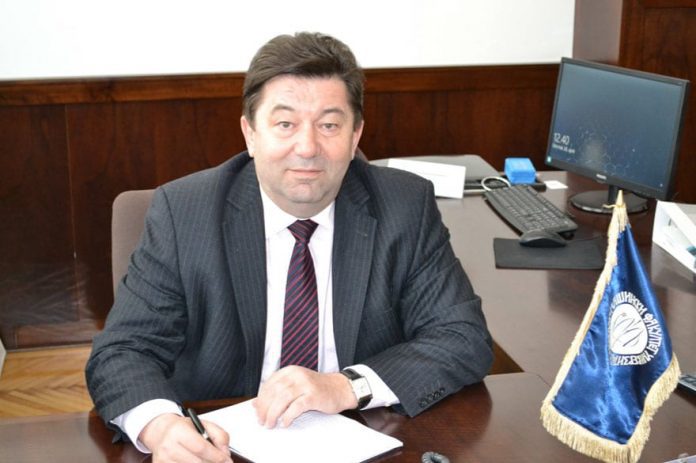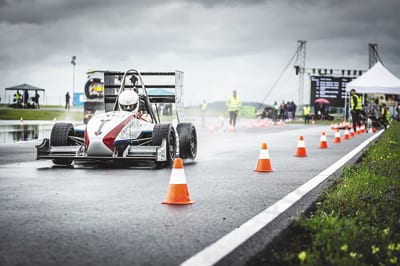
A new form of industrial development, founded on knowledge and new technologies, is only possible to achieve in the triangle of education – economy – state. In this sense, the academic community as a whole, and in particular the Faculty of Mechanical Engineering and allied colleges that deal with information technology, are the creators of ideas and tangible proposals that will act as a guideline for policymakers in defining new strategies and policies for the industrial development of the country.
Where do you see the role of the Faculty of Mechanical Engineering in the industrial development of Serbia?
– In the area of technological development, there are very fast changes happening around the world. That’s why Serbia must find room to develop its high-tech production as soon as possible. We are aware that the most developed countries keep these technologies and products for themselves, while low accumulative branches are left for developing countries, so the gap between them exhists.
That’s why the essence of our approach is for the share of newly created values, based on knowledge, innovation and research, to be as big as possible. I am convinced that in the new international division of labour, Serbia can earn an adequate place even with just a small share of top HI TECH products.
These considerations are a result of the joint work of the Faculty of Mechanical Engineering and representatives of the business community and the relevant ministries of the Serbian Government. In the context of the upcoming negotiations with the EU on Chapter 20, which relates to industrial policy and innovation, it is very important to formulate new strategies of industrial development and to define the interests of Serbia. That’s why we organise a large number of meetings and conferences, including the International Conference “U.S.-EU-Far East-Serbia”, which brings together the world’s leading experts in this field.
I am convinced that in the new international division of labour, Serbia can earn an adequate place even with just a small share of top HI TECH products
Do you agree with the assessment that Serbia neglected industrial and technological development and scientific research in previous decades? In which segment can the Faculty of Mechanical Engineering help?
– Searching for accountability will not lead to change. Our goal is to make a turnaround and offer tangible solutions. The Faculty of Mechanical Engineering can help with its own experience because that is the nucleus of creating new industries based on knowledge.
As a result of a large number of projects, the previous Faculty of Mechanical Engineering improved technical solutions, new technologies, modern testing methods and the like. All staff members, through classes or projects, today train students to take on innovation and entrepreneurship. The establishment of business incubators is envisaged, in which teachers and graduates can establish companies, work on the commercialisation of their ideas and develop innovations.
Our Centre for Lifelong Learning has great cooperation with leading companies like NIS and EPS. We offer competence and the latest results of our own and international research, and knowledge that engineers in practice are lacking.
We are part of the Business-Technical Incubator of the group of technical colleges. We reflect with great dedication on the further improvement of cooperation with the Scientific-Technological Park in Belgrade. We also plan to establish a research and development centre of educational-economic excellence. With that, we will attract foreign companies.
To what extent is Serbia able, in these circumstances and considering the state of the economy, to create a new industrial policy that would significantly improve overall development?
– This is a great political and economic issue. Open global issues include internationalisation (globalism), but also sovereignty. Do countries decide independently on their own technological and industrial development, or are they under the influence of the owners of capital and multinational companies, which is a dominant trend in the world today. I am of the opinion that Serbia has a right, but also an obligation, to decide on its own development itself and for our actions to be in the interest of the development of our state.
It is essential that our decisions are based on our resources. For example, Serbia should not only be orientated towards primary agricultural production, for which it has excellent conditions. The emphasis should be placed on the further processing of raw materials. Through much greater quantities of valuable high-quality products on the global market, along with competitive prices, we will achieve a GDP growth rate of seven per cent or more.
From your perspective as the dean of a higher education institution, what would you include in the reform process in Serbia?
– In the next decade, one of the priorities is certainly the continuation of reforms launched in our education system and its harmonising with the needs of the market economy. That is a complex, lengthy and gradual process. It doesn’t depend only on the relevant ministry or educational institutions, and it also includes all other interest groups, primarily businesses.
The Faculty of Mechanical Engineering is focused on raising the quality of teaching, scientific research, cooperation with industry and international cooperation. We have undertaken a number of activities: we have improved organisation, modernised the content, introduced the visualisation of theoretical teaching, better and more extensive laboratory exercises, expanded and improved professional practice, improved the quality of textbooks and applied modern teaching aids. We carefully monitor world events on the ground. In accordance with good global practice, as of this academic year, we have included introductory courses in mathematics and physics in the teaching process, as well as the institution of mentors. The aim is to facilitate first-year students attending classes and improving their efficiency throughout their studies.
Experience through scientific research is also very important for the quality of teaching. That’s why we stimulate the writing of scientific papers and their publishing in prestigious scientific journals. It is very important to us that the results of our scientists-professors are a good as they can possibly be. Patents and technical solutions are especially important to us. All theoretical, technical and scientific knowledge is best translated into practical values through cooperation with the economy in concrete projects.
Through the developed cooperation that our professors and associates have with business, we realise 30 per cent of our revenue. We also devote great attention to international cooperation through EU projects (Horizon 2020 project or projects within the framework of the Erasmus+ programme). There are also significant bilateral cooperation projects that are financed by the relevant ministry through cooperation with foreign universities, international scientific and professional meetings and the like.
 Have novelties and innovation in the teaching process yielded the expected results?
Have novelties and innovation in the teaching process yielded the expected results?
– We will only have a serious analysis of the results after the January-February test period. The positive assessments of teachers who teach freshmen are undisputed, especially those who participated in the implementing of introductory lectures. According to them, a different approach to teaching is noticeable among students, as well as much greater enthusiasm for studying.
All of the aforementioned is conditioned by considerable financial resources. To what extent is the Faculty of Mechanical Engineering materially equipped to procure modern teaching aids and ensure training in new technologies?
– The Faculty possesses a large number of well-equipped laboratories dedicated to scientific research and work with students. Also, within its composition, alongside the Innovation Centre, there are numerous accredited testing laboratories and inspection bodies. That equipment is modern and compatible with that found at prestigious universities elsewhere in the world. We carry out procurement on the basis of several factors: from projects funded using the financial assistance of the EU through pre-accession assistance (IPA), Erasmus and other international projects; from the budget of the Government of the Republic of Serbia; and, in no small part, with funds resulting from cooperation with the economy.
Student-centred education
The Faculty of Mechanical Engineering nurtures and encourages the entrepreneurial spirit among students through lectures of our former students who are now owners of highly successful companies. Formula Student – Team “Road Arrow” has become a brand, not only of our faculty but of industrial engineering in general. For the past six years, our students, in cooperation with colleagues from other faculties, have independently made racing cars and successfully participated in prestigious international competitions.
Apart from the “Road Arrow”, the Euroavia-Belgrade Students Association also operates, competing in the Air Cargo Challenge. The formation of other student sections is underway, such as in modelling and other areas that are subjects of mechanical engineering studies. Through the encouragement of entrepreneurship, we expect our graduate masters of engineering to acquire both theoretical and practical skills that are increasingly valued and sought in the world.
When it comes to student issues, important roles are played by the Student Parliament and the Student Vice-Dean. Thanks to their good organisation and the tradition that we inherit as professors – paradigm: “Student at the learning centre” is greatly brought to life at this faculty.